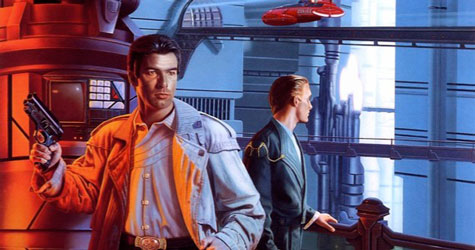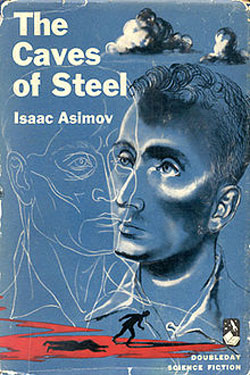
Elijah (“Lije”) Baley is a New York City homicide detective, three thousand years in the future. His world is an overpopulated Earth, with eight billion people living in massive, layered complexes—caves of steel—enclosed by mammoth domes. Washington, Baltimore, Philadelphia, and New York have grown to the point where they are almost touching. Humans no longer know what it is to see natural light (except the elite who live at the top) or experience the feeling of the wind on their back. Even the thought of walking outside their enclosed womb of a city is terrifying, and many people like Elijah have agoraphobia.
There are fifty known planets, called Spacer worlds, where colonists have established new societies and become wealthy due to their low population and abundant supplies—leaving Earth as the runt of the galaxy. The aptly named Spacers who have returned to Earth find integration back on the home planet has its obstacles, the least of which is their fear of the diseased-riddled planet since their own worlds are devoid of such maladies.
The primary wedge, though—one that prevents diplomatic relations between Spacers and Earthlings—is that Spacers are technologically superior and rely heavily on robot servants, while Earthlings have instituted stringent regulations over robot roles, afraid that machines will take jobs and other opportunities away from humans. Elijah overhears a customer in a shoe store balking at being waited on by a machine: “Why can’t I have a decent clerk? Ain’t I respectable?” Coexistence isn’t in the vocabulary for citizens from these opposing cultures.
 The action begins when there is a murder at an outpost on the outskirts of NYC. A Spacer ambassador named Dr. Roj Nemmenuh Sarton, who has rallied against anti-robot regulation, is killed by a blaster. The headache of solving the case falls to Elijah who, to the detective’s chagrin, learns he will be teamed with a Spacers representative. Since the Spacers’ fear of disease prevents them from sending a human to participate in the investigation, they opt to dispatch a robot created by Dr. Sarton, R. Daneel Olivaw—a first-of-his-kind android that looks and acts human but whose knowledge of Earth is limited.
The action begins when there is a murder at an outpost on the outskirts of NYC. A Spacer ambassador named Dr. Roj Nemmenuh Sarton, who has rallied against anti-robot regulation, is killed by a blaster. The headache of solving the case falls to Elijah who, to the detective’s chagrin, learns he will be teamed with a Spacers representative. Since the Spacers’ fear of disease prevents them from sending a human to participate in the investigation, they opt to dispatch a robot created by Dr. Sarton, R. Daneel Olivaw—a first-of-his-kind android that looks and acts human but whose knowledge of Earth is limited.
Daneel admits, “I have been hurried into my role prematurely as a result of the murder.” The commissioner of police privately tells Elijah, “You’ve got to work with him, but see to it that you solve the case and not he. Understand.” Elijah sardonically replies, “You mean co-operate with him 100 percent, except that I cut his throat? Pat him on the back with a knife in my hand?”
Adding insult to injury, the commissioner instructs Elijah to have Daneel stay in the tiny apartment where Elijah lives with his wife, Jessie, and son, Bentley, for the duration of the case. He keeps Daneel’s true identity a secret from his wife, knowing she is just as prejudiced as he is, but she quickly figures out the truth and pushes for Elijah to resign from the investigation.
But, quitting could mean he’d lose his C-5 rating that entitles him and his family to the many privileges they have grown accustomed to. He could also face declassification—a demotion to a job of manual labor, a move to lower dwellings, and fewer perks. Elijah remembers his father’s shame at declassification and his own deprived childhood, so he refuses to walk away from the assignment. He instead requests the police department rent a room for him and his new partner until the case is over, and Elijah’s superiors agree.
Right at the start of the case, however, Elijah nearly torpedoes himself when he mistakenly attempts to point the finger at his robot partner as the chief suspect by first insisting that Daneel, who looks exactly like his creator, is in fact Dr. Sarton and the dead “man” is actually a robot. Then, Elijah quickly follows up with another accusation that Daneel has been re-coded to go against the initial programming of robots never harming humans.
To prove Elijah’s “human” hypothesis wrong, Daneel removes part of his arm, exposing his mechanical innards. Shocked, Elijah passes out.
His ongoing narrow-mindedness and suspicion toward his partner slows down their investigation, and, at one point, he laughably suggests that Daneel could have eaten the murder weapon. The reader will come to the conclusion, long before Elijah, that he and Daneel, given their diverse styles, meld very well—like a futuristic Holmes and Watson, following clues that lead to numerous suspects among both the human sects and the robots.
It took Isaac Asimov’s 1950s vision to pave the way for melding science fiction with other literary genres. According to Asimov, John W. Campbell (editor of Astounding Science Fiction, and leading voice in the community) didn’t believe that sci-fi and detective would mix, griping that technology used to get a gumshoe out of a jam cheated the readers. Asimov weaved this whodunit proving Campbell quite mistaken.
Topics like discrimination and inequality are still relevant today and, in all likelihood, will continue to Elijah’s and Daneel’s time in three millennia; but, other elements of The Caves of Steel are somewhat dated, such as the overt fear of overpopulation—which, in 1954 (then two billion), eight billion people must have seemed astounding. Yet, we are due to reach this number in about ten short years from now.
Asimov didn’t approve of profanity in his tales, and the hot tempered Elijah uses “Jehoshaphat” quite a bit. It pulled me out of the story, at first, but I grew accustomed fast enough. If I have any complaint with Steel, it would be Elijah’s wife Jessie, who seems very much a product of the pre-feminism 1950s period. She engages in gossip with her local group of ladies, and an error of judgment on her part directly affects her husband’s murder case.
Still, it doesn’t detract from this novel—first serialized in Galaxy Magazine in 1953, with the hardcover edition following in 1954. Both characters went on to appear in several more Asimov novels, including: Naked Sun, The Robots of Dawn, and Robots and Empire.
After winning a Retro Hugo award in 2004, and now sixty years later from its original release, The Caves of Steel is a deserving classic.
See also: R. Is for Robot: Reviewing The Naked Sun by Isaac Asimov
Images via geeksofdoom.com & Wikipedia
To learn more or order a copy, visit:
David Cranmer aka Edward A. Grainger is the publisher and editor of BEAT to a PULP books and author of The Drifter Detective #7: Torn and Frayed. He lives in New York with his wife and daughter.

Not my cup of tea, but Asimov thinks deep. Who knows what will happen in three thousand years? His guess is as good as anybody’s.
You like detective novels, Oscar? If so, this is well-worth your reading time.
Away from the domestic scene, internationally, Kenya’s standing has improved in the last decade.